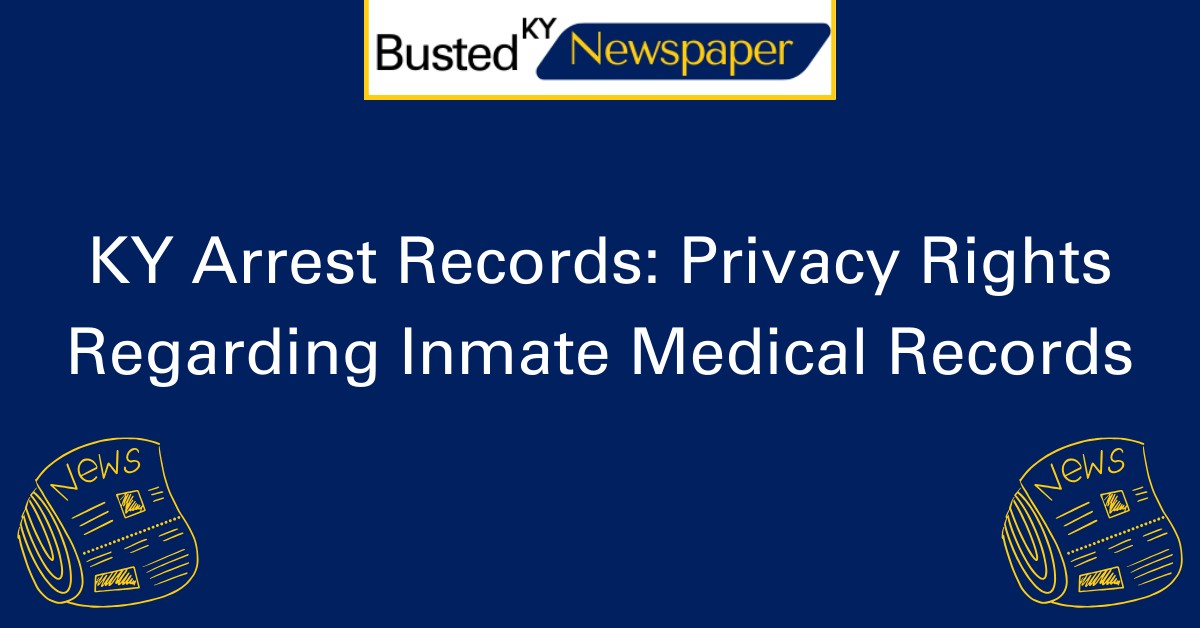KY Arrest Records: Privacy Rights Inmate Medical Records
Understanding the privacy rights surrounding inmate medical records is crucial when it comes to KY arrest records. In this comprehensive guide, we will explore the laws and regulations that protect the confidentiality of inmate medical information. Whether you are a concerned family member, a legal professional, or simply an individual interested in learning more about the topic, this Comprehensive Guide will provide you with valuable insights.
When it comes to inmate medical records, privacy is a fundamental right that should be respected. The state of Kentucky recognizes this importance and has enacted specific laws to safeguard the confidentiality of these records. In this guide, we will delve into the legal framework surrounding inmate medical records in KY, discussing the rights of inmates, the responsibilities of healthcare providers, and the limitations imposed by privacy laws.
Importance of Privacy Rights in Inmate Medical Records
When it comes to inmate medical records, privacy is a fundamental right that should be respected. The state of Kentucky recognizes this importance and has enacted specific laws to safeguard the confidentiality of these records. In this guide, we will delve into the legal framework surrounding inmate medical records in KY, discussing the rights of inmates, the responsibilities of healthcare providers, and the limitations imposed by privacy laws.
Protecting Inmate Privacy: Understanding the Rights of Inmates
As individuals in custody, inmates have unique rights when it comes to their medical records. These rights are designed to ensure their privacy and protect their confidential information. In this section, we will explore the specific rights that inmates have regarding their medical records and how these rights are enforced within the prison system.
The Role of Healthcare Providers: Responsibilities and Duties
Healthcare providers play a crucial role in maintaining the privacy of inmate medical records. They are responsible for handling and safeguarding sensitive information while providing necessary medical care to inmates. This section will outline the responsibilities and duties of healthcare providers in maintaining the confidentiality of inmate medical records, as well as the consequences for breaching this trust.
Navigating Privacy Laws: Understanding the Limitations
Privacy laws play a vital role in protecting the confidentiality of inmate medical records. However, these laws also impose certain limitations on access and disclosure. In this section, we will explore the specific privacy laws that govern inmate medical records in Kentucky, including the circumstances under which access to these records may be granted and the exceptions to confidentiality.
The Impact of Privacy Breaches: Consequences and Legal Recourse
Privacy breaches can have severe consequences for both inmates and healthcare providers. This section will discuss the potential ramifications of privacy breaches, including legal consequences and the available recourse for individuals affected by such breaches. It will also highlight the importance of proper training and protocols to prevent privacy breaches in the first place.
FAQ’s
What are inmate medical records?
Inmate medical records are comprehensive documents that detail the health history, medical treatments, and healthcare interactions of individuals who are incarcerated. These records encompass a wide range of information, including but not limited to diagnoses, prescribed medications, surgical procedures, and mental health assessments. In essence, they provide a thorough account of an inmate’s health status and the medical care they have received while in custody. Inmate medical records play a vital role in ensuring continuity of care, as they enable healthcare providers within correctional facilities to make informed decisions regarding the health and well-being of the inmates under their supervision.
The privacy of inmate medical records is paramount for several reasons. First and foremost, it upholds the fundamental right to healthcare confidentiality, which is crucial for maintaining trust between inmates and healthcare providers. Protecting these records also prevents the unauthorized dissemination of sensitive health information, safeguarding inmates from potential stigmatization or discrimination based on their medical history. Moreover, inmate medical record privacy contributes to a more effective and reliable healthcare system within correctional facilities, as inmates are more likely to disclose accurate and detailed information when they trust that their medical history will be treated with the utmost confidentiality.
Kentucky, like many other jurisdictions, has established specific laws governing the privacy of inmate medical records. These laws are designed to strike a balance between ensuring necessary healthcare access for inmates and protecting their right to medical privacy. In compliance with state regulations, correctional facilities, and healthcare providers must implement stringent measures to safeguard the confidentiality of inmate medical records. These laws typically outline the circumstances under which access to these records is permissible, with strict penalties for unauthorized disclosure. Understanding and adhering to Kentucky’s inmate medical record privacy laws is essential for maintaining the integrity of the correctional healthcare system while respecting the rights of incarcerated individuals.
Inmates possess certain rights concerning their medical records, emphasizing the importance of informed consent and access to their health information. These rights empower inmates to be actively involved in decisions about their healthcare, ensuring that they are well-informed about diagnoses, treatments, and any potential risks associated with medical interventions. In addition, inmates have the right to request and obtain copies of their medical records, enabling them to stay informed about their health status and treatment plans. These rights are fundamental in upholding the dignity and autonomy of inmates, acknowledging their agency in managing their healthcare even within the confines of a correctional setting.
Conclusion
In conclusion, understanding the privacy rights surrounding inmate medical records is crucial for maintaining the integrity of the healthcare system within correctional facilities. By respecting these rights and adhering to the laws and regulations in place, we can ensure that inmate medical information remains confidential and protected. Together, we can strive for a future where privacy is upheld and everyone’s medical records are treated with the respect they deserve.







